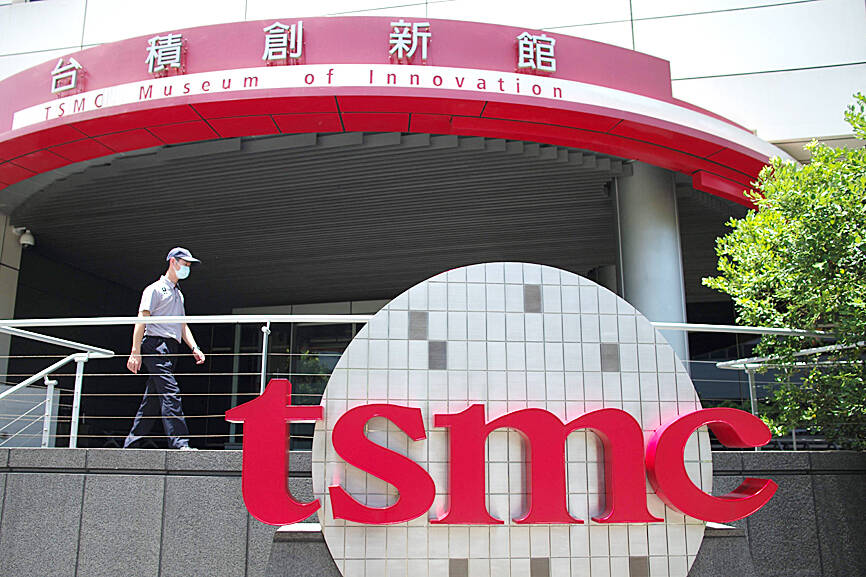Taiwan Semiconductor Manufacturing Co’s (TSMC, 台積電) board of directors yesterday approved capital appropriations of US$29.62 billion to install and upgrade the firm’s chip manufacturing process technologies, as well as its advanced and mature packaging technology capacity.
The capital expenditure budget would also be for fab construction and installation of manufacturing facilities, the world’s biggest contract chipmaker said in a statement.
TSMC did not comment on reports that it was in talks with flat-panel display maker Innolux Corp (群創) to acquire an idle plant as it prepares to convert manufacturing equipment into a new chip packaging production line that is to use fan-out panel-level packaging (FOPLP) technology.

Photo: AFP
Innolux said that about 60 percent of the idle plant’s manufacturing equipment could be reused for the FOPLP technology and its employees have a lot of experience and know-how about glass panel substrates, which are used in panel-level packaging to achieve heterogeneous integration of chips.
TSMC chairman C.C. Wei (魏哲家) last month told investors that the company was “looking at this kind of a panel-level fan-out technology,” as he believed the technology would be mature in about three years.
The chipmaker last month said it planned to spend US$28 billion to US$32 billion this year on new facilities and equipment, with a significant portion earmarked for advanced process technologies such as 2-nanometer technology.
About 10 percent of the capital budget would be for advanced packaging, testing and mask making, it said.
The board in the statement approved a cash dividend of NT$4 per share for the second quarter, as net profit was NT$247.85 billion (US$7.63 billion), or earnings per share of NT$9.56.
The board also gave the go-ahead for a new capital injection of up to US$7.5 billion to TSMC Arizona, a wholly owned subsidiary of TSMC, and the issuance of 2.353 million new “restricted shares” to attract and retain executives and talent, it said.

Shiina Ito has had fewer Chinese customers at her Tokyo jewelry shop since Beijing issued a travel warning in the wake of a diplomatic spat, but she said she was not concerned. A souring of Tokyo-Beijing relations this month, following remarks by Japanese Prime Minister Sanae Takaichi about Taiwan, has fueled concerns about the impact on the ritzy boutiques, noodle joints and hotels where holidaymakers spend their cash. However, businesses in Tokyo largely shrugged off any anxiety. “Since there are fewer Chinese customers, it’s become a bit easier for Japanese shoppers to visit, so our sales haven’t really dropped,” Ito

The number of Taiwanese working in the US rose to a record high of 137,000 last year, driven largely by Taiwan Semiconductor Manufacturing Co’s (TSMC, 台積電) rapid overseas expansion, according to government data released yesterday. A total of 666,000 Taiwanese nationals were employed abroad last year, an increase of 45,000 from 2023 and the highest level since the COVID-19 pandemic, data from the Directorate-General of Budget, Accounting and Statistics (DGBAS) showed. Overseas employment had steadily increased between 2009 and 2019, peaking at 739,000, before plunging to 319,000 in 2021 amid US-China trade tensions, global supply chain shifts, reshoring by Taiwanese companies and

Taiwan Semiconductor Manufacturing Co (TSMC, 台積電) received about NT$147 billion (US$4.71 billion) in subsidies from the US, Japanese, German and Chinese governments over the past two years for its global expansion. Financial data compiled by the world’s largest contract chipmaker showed the company secured NT$4.77 billion in subsidies from the governments in the third quarter, bringing the total for the first three quarters of the year to about NT$71.9 billion. Along with the NT$75.16 billion in financial aid TSMC received last year, the chipmaker obtained NT$147 billion in subsidies in almost two years, the data showed. The subsidies received by its subsidiaries —

Taiwan Semiconductor Manufacturing Co (TSMC) Chairman C.C. Wei (魏哲家) and the company’s former chairman, Mark Liu (劉德音), both received the Robert N. Noyce Award -- the semiconductor industry’s highest honor -- in San Jose, California, on Thursday (local time). Speaking at the award event, Liu, who retired last year, expressed gratitude to his wife, his dissertation advisor at the University of California, Berkeley, his supervisors at AT&T Bell Laboratories -- where he worked on optical fiber communication systems before joining TSMC, TSMC partners, and industry colleagues. Liu said that working alongside TSMC